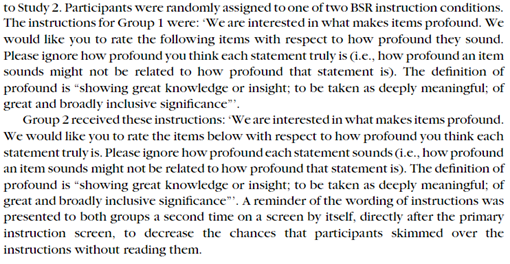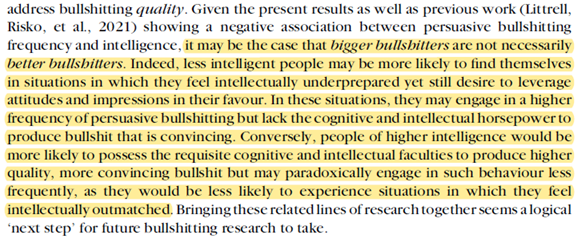
Excited to announce our new paper showing that persuasive BSers are more susceptible to falling for misleading information is now published in British Journal of Social Psychology! That is, you CAN “bullshit a bullshitter.” #bullshitting #bullshit 1/ bpspsychub.onlinelibrary.wiley.com/doi/full/10.11…
First, I’m actually kinda shocked I got that title through review but, hey, it’s official now! Being a potty mouth is a legitimate scientific endeavour now. 😉 Now, on to the show… 2/
So, S1 looked at associations of bullshitting frequency (persuasive and evasive) with 3 types of misleading info (pseudo-profound BS, scientific BS, fake news). Persuasive BSing pos. predicted receptivity to all 3. Evasive BSing neg. predicted receptivity. 3/ 

These predictive associations held even when controlling for contextually relevant non-bullshit information (i.e., actually profound statements, real scientific statements, real news headlines). 4/ 

S2 showed positive predictive relation btwn persuasive BSing – BS receptivity robust even when controlling for potential cog & metacog. moderators. I basically threw every cognitive thing I could think of at the association to see what might reduce it. Turns out, not much. 5/
Those other predictors: general profoundness receptivity (motivational quotes), CRT, self-reported metacognitive insight, self-reported intellectual overconfidence, cognitive ability (combo of numeracy & crystallized verbal intelligence), & cognitive ability bias (calculated). 6/ 

S3 examined if positive association btwn persuasive BSing frequency and BS receptivity is b/c persuasive BSers unable to differentiate superficial profoundness from actual profoundness (i.e., unable to distinguish btwn BS and non-BS). Two groups, two sets of instructions. 7/
S3 Between-Groups design.
Group 1: rate items by how profound they sound. Ignore how profound you think they actually are.
Group 2: rate items by how profound they actually are. Ignore how profound you think they sound. 8/
Group 1: rate items by how profound they sound. Ignore how profound you think they actually are.
Group 2: rate items by how profound they actually are. Ignore how profound you think they sound. 8/

Results showed higher frequency persuasive BSers rated “sounds profound” roughly equal to “is profound.” In other words, it seems persuasive BSers interpret superficial profoundness as a cue/signal of actual profoundness. Evasive BSers better able to distinguish the two. 9/ 

Overall, found that persuasive BSing (those who BS to impress, persuade, etc.) positively predicts falling for various types of misleading info (bullshit) & this is robust to a slew of potential moderators. 10/
Seems driven by fact that bigger persuasive BSers appear to interpret semantically inscrutable yet superficially impressive linguistic cues as signals of legitimacy or informational authoritativeness. 11/ 

Also supported prior findings of neg result btwn persuasive BSing and cog ability and analytic thinking. Tho seems intuitive that BSers are smarter, seems that bigger BSers not necessarily better BSers. 12/ 

Also, persuasive and evasive BSing continue to show consistent differences in their relations to cognitive and other ind. diff factors, so we’ll continue to explore the underlying motivations behind both rhetorical strategies. 13/ 

In summary, ppl who intentionally spread misinfo seem to be more susceptible to falling for misinfo (the irony!). Sheds more light on how misinfo spreads & perhaps a scientific explanation for why some politicians retweet/regurgitate things they watched on Fox & Friends. 😉14/
BTW, here's the non-paywalled version of the paper: psyarxiv.com/5c2ej/
• • •
Missing some Tweet in this thread? You can try to
force a refresh



